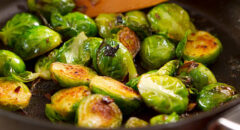
\When you think of “healthy food” what immediately comes to mind? Probably a lot of salad options, green leafy vegetables, the universal vegetable blend (yup! That one. The carrots, corn and green bean bag that you can grab in the frozen section, eh!) that lack in taste and aren’t very appealing, and just about anything that presents as low-fat or fat-free, right? Now, it may be my roots and growing up in a Jamaican/Indian-American household, but we don’t sacrifice taste. Ever! I mean, who said that you have to sacrifice taste for healthy food? Two things can be true, you can be on a healthy diabetic diet that tastes like granny’s cooking and never have to sacrifice taste.
Diabetes is a chronic, long-lasting condition that affects how your body turns food into energy. Meaning, that your body breaks down the food that you eat into sugar (glucose) and then releases it into your bloodstream. This is why it’s so important to be mindful of what you eat.
Signs and symptoms that you may need to seek a healthcare provider:
- Feeling weak and/or tired
- Feeling dehydrated/thirsty more than usual
- Dry skin
- Blurry vision
- Often mood swings, like irritability
- Urinating often/ketones in urine
- Slow healing sores
- Losing weight without trying
- Numb and/or tingling in the feet or hands
- Getting infections more frequently, like vaginal infections or skin infections
It’s important to know that long-term complications of diabetes develop gradually. So, the longer you have diabetes, the longer your blood sugar is less controlled. This creates a higher risk of other complications.
These possible risks include:
- Nerve damage when too much sugar injures the walls of the tiny blood vessels (capillaries) that nourish the nerves, especially in the legs
- Foot damage will occur when there’s poor / not enough blood flow or when nerve damage occurs in the feet
- Eye damage caused by damaged blood vessels in the eyes
- Skin and mouth complications, like bacterial and fungal infections
- Hearing impairment is more common in people with diabetes
- Kidney damage caused by damage to the “filtering system”
- Depression symptoms are common in people with diabetes
Some tips on managing diabetes:
- Lose excess weight(work with your trusted healthcare provider to create a weight-loss plan tailored just for you)
- Physical activity / better lifestyle changes that impact your overall well-being (physical activity improves blood flow, lowers blood glucose levels, burns extra calories, lowers blood pressure and improves your mood)
- Oral medication and/or prescribed insulin, which helps to manage blood glucose levels
- Test your blood sugar daily
- Getting regular health screenings by your healthcare provider
- Eat balanced meals/ control your blood sugar through diet(lower in fat and calories and higher in fiber)
Eating healthy means following a healthy eating pattern that includes a variety of nutritious foods and drinks. It’s vital that you get the number of calories that’s right for you, meaning not eating too much or too little.
You should speak to your doctor about your personalized calorie intake. If you’re in need of a culturally sensitive doctor, explore here.
Controlling your blood sugar through diet—a diabetic diet that tastes like granny’s cooking to be exact. Yes, that good soul food. Here are some options that just might surprise you.








